If your child is overweight or obese, helping them to lose weight may seem like the right thing to do. However, think again before you start putting them on diets or restricting calories.
There is no ideal weight for young children as they are always growing!
In the previous post, I provided tips and advice on how to help an underweight child. The main point I made was that regardless of your child's size, the feeding practices remain the same!
Because it's that important, I want to emphasize here again that the primary goal and focus shouldn't be about the weight. THE ultimate goal is health and happiness! And our efforts should be towards helping our children find enjoyment in eating foods that help them grow and in activities that move their bodies.
Additional tips
- Be extra mindful and cautious about the language you use around food and weight.
- Don't constantly talk about healthy eating.
- Instead, simply model what healthy eating is. Actions speak louder than words.
- Do serve well-balanced, nutritious meals most of the time. If foods that promote excess weight, like sugar and fried foods, are served every day more than once, start replacing them with more healthful choices. Start by making small changes. For instance, if your pantry is filled with all kinds of packaged snacks, have your child pick just 1-2 items from the store for the week.
- Don't put them on a diet. Don't restrict food. Don't push low-calorie foods or try to control portion size.
- Dieting is one of the top predictors for developing an eating disorder
- These tactics will only lead to more undesirable behaviors, like sneaking in food, bingeing, etc.
- I would go as far as to say that failing to give you child enough food is a form of neglect.
- Don't cut out fat. A low-fat diet may actually promote weight gain bc chances are, dietary fats will get replaced with refined carbohydrates. Instead, consider your child's whole diet pattern. It's never a good idea to get fixated on the amount of sugar, fat, or other nutrients in individual foods. I personally recommend sticking with full-fat foods. Fat helps with satiety and makes food taste delicious!
- Make it a family affair. Don't single out your child. For instance, if you're limiting sugary drinks for your child, then the whole family should do so as well. Make sure the entire family is on board and supportive of healthful habits. Shop for foods together, get them involved in simple food preparation, go on walks, spend time together, enjoy the same meal together as often as possible.
- If your child is constantly overeating, take a close look at your feeding practices. Are you following the tips suggested above? Is there an established mealtime schedule? Are you following the division of responsibility? How are you handling the snacks? Are you regularly including treats so that your child doesn't see them as forbidden or something to be earned?
And remember, your big child is entitled to eat as much as they're hungry for. That's responsive feeding. That's trusting their remarkable ability to self-regulate, which they will do so beautifully if we do our job of feeding and fully allow them do their job of eating!
How to strike a balance
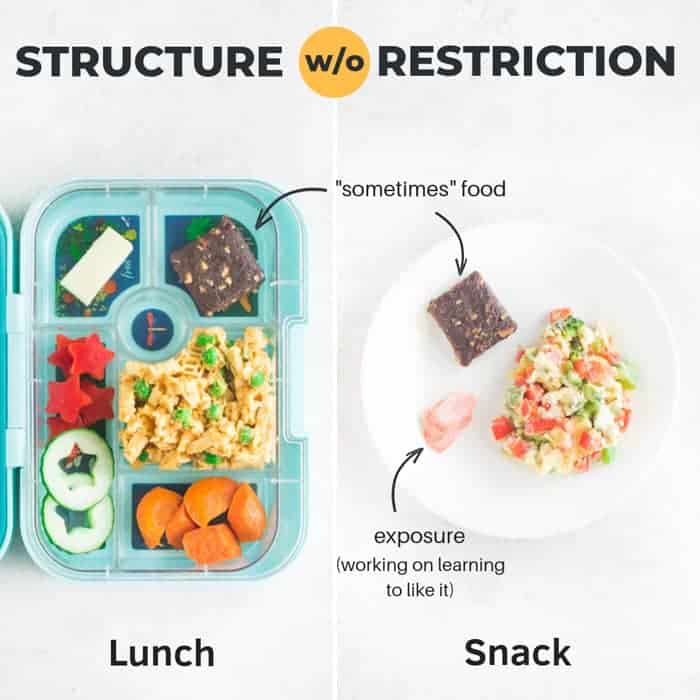
I've mentioned several times that you shouldn't restrict food. But what if your child is obsessed with the not-so-healthy kinds? What's really important is for you to use neutral language around food and not make it a big deal. The last thing you want to do is label food as good or bad.
Black and white thinking doesn't help your child learn about all foods.
It is our job as parents to find a healthy balance that involves exposing them to ALL foods (not just the healthy ones) and teaching them to navigate them as they grow. So what are practical ways you can do this? Check out this post - How to tame your child's sugar cravings. I focus on sweets in that post but the tips and strategies apply to other foods as well.
When to seek help
I'd also like to add that some kids are genetically predisposed to carry extra weight their entire lives. And they may be perfectly healthy, happy, and active even if their numbers put them in the overweight category. If this is your child, it's important that you (and we as a society) accept your child for who they are.
Now, if their health parameters (lipid panels, blood pressure, blood sugar levels, etc.) are of concern and you feel that both your child and the entire family can benefit from learning and implementing balanced eating and healthy lifestyle strategies, these are all great reasons to seek professional help.
Not just anyone with credentials, though. You want to seek healthcare providers who don't promote a diet for weight loss. Instead, work with someone who focuses on family-based prevention and a healthy lifestyle program that doesn't involve singling out your child. Remember, this is a family affair!
The Big Picture
What I want to encourage all the parents, myself included, is this:
Stop putting so much value on all the numbers, which are poor indicators of health and overall well-being. Instead, let's focus our efforts on raising joyous, mindful eaters. Let's help our children to develop a healthy relationship with food, good eating habits, and positive body image.
Let's help them feel wonderful in their bodies, no matter the size.
And if you have a preconceived notion about how much your child should eat and what their weight/body size should be, it's time to toss that out the door! ASAP!
Remember, when it comes to health, food is just one piece of the puzzle. Therefore, take the holistic approach and nourish the whole child. Let's enjoy healthy foods at home, move together as a family, limit screen time, encourage good sleeping habits......(what else would you add to this list?)
Most importantly, let's shower them with unconditional love and support! By nourishing your child inside and out, they WILL naturally grow into the body they feel the healthiest, most confident, and happiest in!

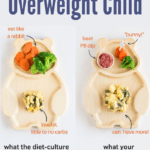
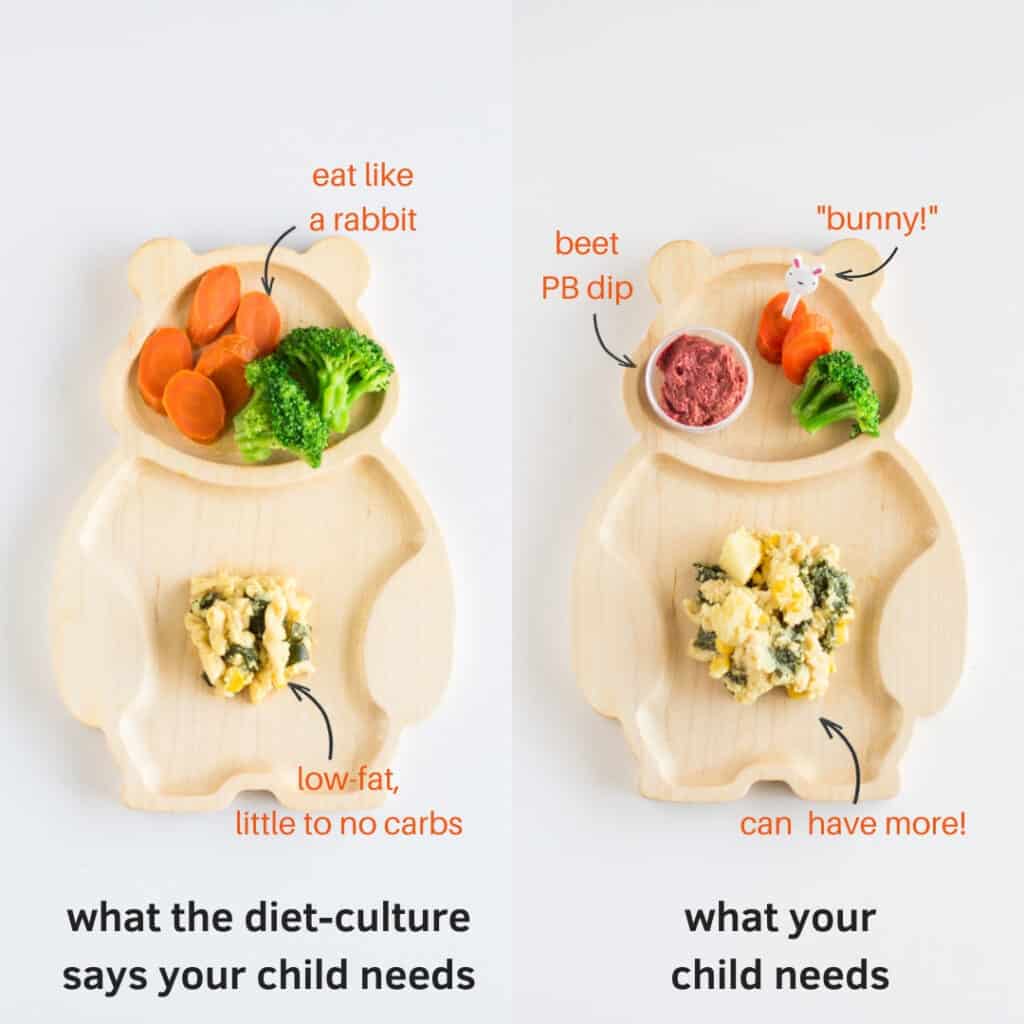
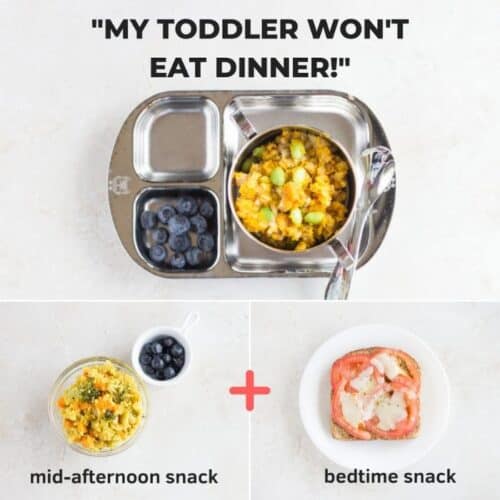
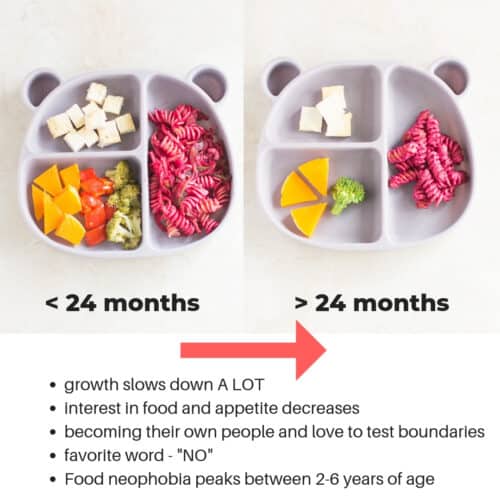
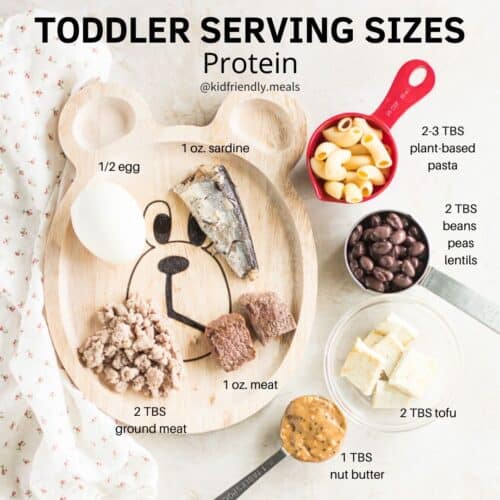


Leave a Reply